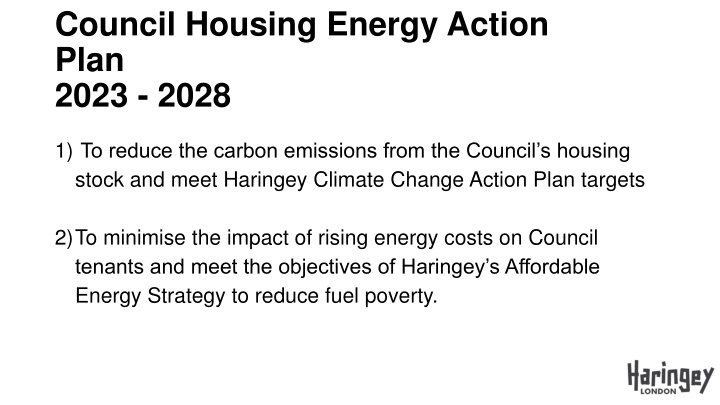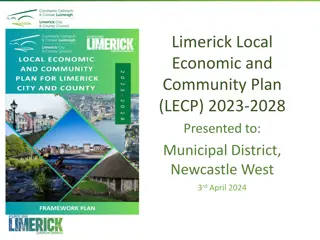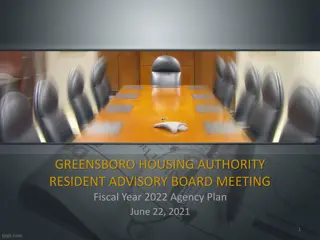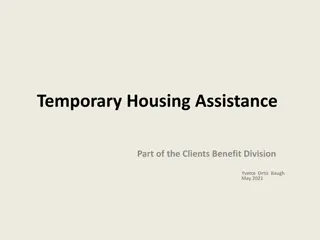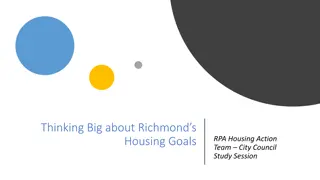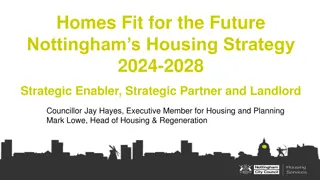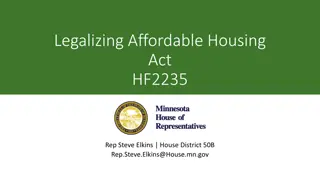Council Housing Energy Action Plan 2023-2028
This action plan aims to reduce carbon emissions from the Council's housing stock, address rising energy costs for tenants, and combat fuel poverty. Through whole house retrofit plans and strategic principles, the plan focuses on maximizing impact while phasing out gas boilers, complying with retrofit standards, and leveraging external funding.
Download Presentation

Please find below an Image/Link to download the presentation.
The content on the website is provided AS IS for your information and personal use only. It may not be sold, licensed, or shared on other websites without obtaining consent from the author.If you encounter any issues during the download, it is possible that the publisher has removed the file from their server.
You are allowed to download the files provided on this website for personal or commercial use, subject to the condition that they are used lawfully. All files are the property of their respective owners.
The content on the website is provided AS IS for your information and personal use only. It may not be sold, licensed, or shared on other websites without obtaining consent from the author.
E N D
Presentation Transcript
Council Housing Energy Action Plan 2023 - 2028 1) To reduce the carbon emissions from the Council s housing stock and meet Haringey Climate Change Action Plan targets 2)To minimise the impact of rising energy costs on Council tenants and meet the objectives of Haringey s Affordable Energy Strategy to reduce fuel poverty.
Underlying Principles Whole House Retrofit Plans with a fabric first approach Worst first alongside integration with major works programmes To align with borough wider strategic objectives to deliver maximum impact To phase out the installation of new gas boilers after 2026 Compliance with Government retrofit standards (PAS2035/2030) and Trustmark. Working in partnership with tenants on co-design Support innovation in reducing energy costs To use HRA budget to leverage additional external funding and secure value for money
Metrics & Principles Whole House Retrofit with pre and post evaluation and monitoring Fabric Standard Maximum heat demand metric standard 46 kWh/m2 for semi detached homes; 39 kWh/m2 for other dwellings in modelling and post works Insulate tight / ventilate right all improvements must have ventilation assessment and improvements Installers to identify and mitigate thermal bridges Low carbon Heat & power Likely heat pump replacement but trial of new technologies where appropriate DEN connections on route blocks following feasibility assessment Solar pv / solar thermal installs to reduce dependence on grid street level properties Behavioural support provided to tenants
Key Risks Availability of future funding and uncertainty around future material costs given the current volatility of the market and the increasing demands on the HRA e.g. building safety requirements Unintended consequences of retrofit e.g., mould, condensation, overheating Inability to secure conservation and planning approvals Failure to engage residents effectively
Stock Selection Criteria Targeting the worst performing stock, to prioritise those in fuel poverty Alignment with the planned major works or boiler replacement programmes to reduce enabling costs (e.g., for scaffolding) and disruption for residents and maximise match funding Utilising void periods to undertake retrofit measures alongside remedial works To complement regeneration, new build projects and any external wall works programme resulting from the Fire Risk Appraisal of external walls (FRAEW)
Key Activities 2023/24 Improvement of data Pilot street property retrofit 289 properties Piloting of monitoring equipment Piloting of NexGen radiant heating and ASHPs Training Housing Property team Tenant engagement campaign Programming future retrofits Reviewing gas contracts
Retrofit for Haringey 01 218 properties N10 + Additional 71 Properties in N17 Possible Measures Fabric First External Wall Insulation Triple Glazing Windows Loft Insulation Front Doors
Retrofit for Haringey 01 218 properties N10 + Additional 71 Properties in N17 Next Steps Procurement process commenced for a Coordinator & Designer Project letter to be sent to all residents within 01 project Retrofit Assessments to be carried out these involve visits to all properties by an Accredited surveyor Project team assemble to set Intended Outcomes and project targets Procurement process to commence for an Installer (Contractor)
Skills and Training - internal Retrofit Training Academy 2 x retrofit co-ordinators 2 x retrofit advisors Review of working practices what PAS2035/30 means for all housing projects
Skills and Training local supply chain Delivery Partner contract - requirement to work with local SMEs UKSPF funding bid with London Borough Of Barnet 12 London Boroughs articulation of the retrofit market At least 100 SMEs will be engaged, and 60+ recruited for support to get the skills they need to become retrofit supplier ready eligible for government-funded retrofit works which require PAS2030 and Trustmark certification. SMEs will join a peer-to-peer network receiving retrofit opportunities, supporting each other and encouraging new entrants.
Skills and Training local supply chain Innovate UK Bid SME retrofit outreach activities to engage existing contractors in retrofit and understand their current capacity. Mentoring existing businesses to become members of the Retrofitworks Co-operative or sub-contractors on council retrofit programmes and to encourage diversification of skills for expansion. Deliver introduction to green skills courses and develop further training opportunities with Conel. Engage manufacturers and installers to understand requirements for industrial or training space in Haringey. A feasibility study and development of a mechanism to de-risk expansion for companies. Use council domestic retrofit projects for showcase events giving local contractors and students the opportunity to speak to those working in the industry. A feasibility study and development of a Scheme - where homeowners who are keen to retrofit and build the local economy can sign up and pay a deposit to undertake a retrofit when businesses upskilled to undertake the works. Set up a grant scheme using carbon offsetting funds from the planning process to encourage homeowners to sign up to this scheme with their neighbours Train vetted SMEs to "upsell" retrofit improvements.
